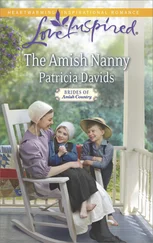She’d simply have to rise early tomorrow and again on Monday and Tuesday mornings to get as much of the washing, mending and cleaning done as she could before her bus left. Her grandfather might not want her here, but she would do all that she could for him before she left, even if she disliked mending with a passion.
It was a shame that Clara hadn’t come with her. Clara loved needlework. Her tiny stitches were much neater than Lizzie could manage. Each of the girls had a special talent. Lizzie liked to cook. Betsy was good with animals. Clara, like their mother, enjoyed sewing, quilting and knitting. Greta avoided housework whenever she could. She enjoyed being outside tending the orchard and the gardens.
Just thinking about them made a deep sadness settle in Lizzie’s soul. She had failed miserably to help them thus far, but the good Lord had given her more time. She wouldn’t waste it feeling sorry for herself.
She smiled at her grandfather. “I hope you like the stew. I do enjoy cooking. I couldn’t help noticing your garden hasn’t been prepared for spring planting yet. It’s nearly time to get peas and potatoes planted. My sister Greta would be itching to spade up the dirt. The Lord blessed her with a green thumb for sure.”
Her grandfather ran his last bite of biscuit around the rim of his bowl to sop up any traces of gravy. “The planting will get done after the lambing.”
“Of course. You probably know there’s barely any preserved food left in the cellar. I used the last of the canned beef and carrots for tonight’s meal. There will be only canned chicken for the next meals unless you can provide me with something fresh or allow me to go into town and purchase more food. What a shame it is to see an Amish cellar bare. At home, my sisters and I have hundreds of jars of meat, corn and vegetables. Do you like beets, Daadi?”
“Not particularly.”
“I like snap peas better myself.” She fell silent.
“There are plenty of eggs in the henhouse. We men know how to make do.”
There had to be a way to convince him of her usefulness. Perhaps after he saw the results of her hard work over the next several days he would agree to let her stay.
Joe pushed his empty bowl away and brushed biscuit crumbs from his beard and vest. “You’re a goot cook, I’ll give you that.”
“A mighty good cook. Thank you for the meal,” Carl added.
“You’re welcome.” She wasn’t used to being thanked for doing something that was her normal responsibility.
Her grandfather swallowed the last swig of his coffee and set the cup in his bowl. “I reckon it’s time to start moving the flocks closer to the barns.”
Carl nodded. “I can put the rams and the first of the ewes in the barn tomorrow in separate pens.”
“No point penning them inside just yet. Monday will be soon enough. Shearing can start on Tuesday.”
Lizzie brightened. Perhaps the sheep held the key to proving her usefulness. “Can I help with that? I’d love to learn more about sheep and about shearing them.”
Joe huffed in disgust. “If you don’t know sheep, you’ll be no use to me.”
She looked at Carl. He didn’t say anything. She was foolish to hope for help in that direction. Suddenly, she remembered the mail she had collected earlier. There had been a letter for him. She went into the living room and returned with her grandfather’s copy of the local newspaper and an envelope for Carl.
Her grandfather’s eyes brighten. “Ach, my newspaper. Danki. I like reading it after supper.”
She turned to Carl and held the letter toward him. “This came for you.”
When he didn’t take it, she laid it on the corner of the table and resumed her seat.
Rising to his feet, Carl picked up the letter, glanced at it and then carried his empty bowl to the sink. Turning to the stove, he lifted the lid on the firebox and dropped the letter in unopened. He left the house without another word.
After the screen door banged shut behind him, Lizzie gathered the rest of the dishes and carried them to the sink. She stared out the window at his retreating back as he walked toward the barn and the pasture gate beyond.
His dog came bounding across the yard and danced around him, seeking attention. He paused long enough to bend and pat the animal. Straightening, he glanced back once at the house before he walked on.
What had he done to cut himself off from his family, his friends and from his Amish faith? Why burn an unopened letter? Why live such a lonely life with only a dog and an old man for company? Carl King was an intriguing man. The longer she was around him, the more she wanted to uncover the answers about him.
“Out with your questions before you choke on them,” her grandfather said, still seated at the table.
“I don’t know what you mean.” She began filling the sink with water.
“Ja, you do. You want to know about Carl.”
She couldn’t very well deny it when she was bursting with curiosity about the man. She shut off the water and faced her grandfather. “I don’t understand how you can do business with him. It is forbidden.”
“I do no business with him.” He opened his paper and began to read.
She took a step toward him in disbelief and propped both hands on her hips. “How can you say that? He works for you. He’s your hired man.”
“I did not hire Carl. He works here because he wishes to do so. He lives in an empty hut on my property. He pays no rent, so I am neither landlord nor employer.”
“You mean he works for nothing?”
Folding his paper in exasperation, he said, “Each year, when the lambs are sold, I leave one third of my profits here on the kitchen table, and I go to bed. In the morning, the money is always gone.”
“So you do pay him?”
“I have never asked if he’s the one who takes the money.”
She crossed her arms over her chest. “Don’t you think that is splitting hairs?”
“No doubt some people will say it is.”
“Aren’t you worried that you may be shunned for his continued presence here?”
He leaned back in his chair. “What would you have me do?”
“You must tell him that unless he repents, he must leave. What has he done to make all your church avoid him?”
“I have no idea.”
“But all members of the church must agree to the shunning. How can you not know the reason? It is not a thing that is done lightly or in secret.”
“In all my years, I have seen it done only a handful of times. It was very sad and distressful for those involved. Carl is not from around here. He has not been shunned by my congregation. I would not have known he was anything but an Englisch fellow in need of a meal and a bed if he hadn’t told me. It seems to me that he holds our beliefs in high regard.”
“Then for him to remain separated from the church is doubly wrong, and all the more reason to send him away.”
Her grandfather let his chair down and leaned forward with his hands clasped on the table. “Child, why do we shun someone?”
“Because they have broken their vows to God and to the church by refusing to follow the Ordnung.”
“You have missed the meaning of my question. What is the purpose of shunning an individual?”
“To make them see the error of their ways.”
“That is true, but you have not mentioned the most important part. It is not to punish them. Shunning is done out of love for that person so that they may see what it is to be cut off from God and God’s family by their sin. It is a difficult thing to do, to care for someone and yet turn away from them.”
“But if they don’t repent, we must turn away so that we do not share in that sin.”
“If I give aid to a sinner, does that make me one?”
Читать дальше












